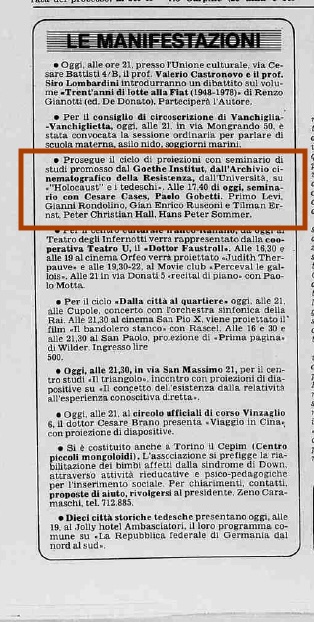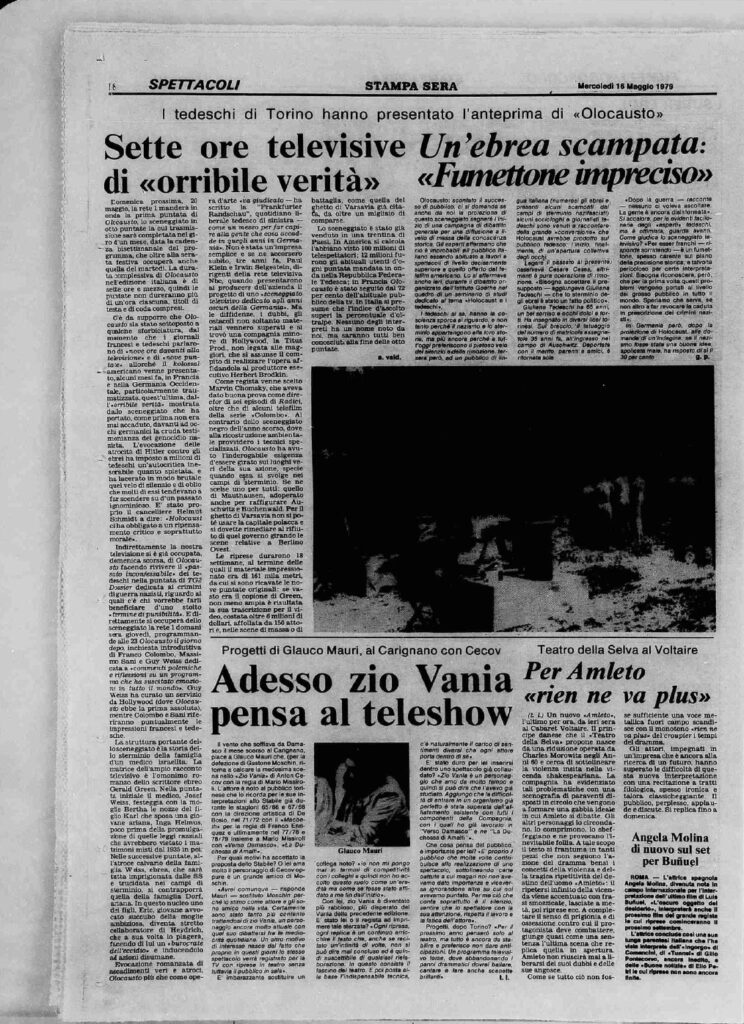Holocaust, Marvin J. Chomsky’s 1978 television miniseries starring Meryl Streep and James Woods, was broadcast in the United States in April 1978. It appeared in Italy the next year, in six episodes that aired between May 20 and early July 1979 on Rai 1. In 1979, it was also broadcast in West Germany (January) and in Austria (March). In these two countries, the series sparked a wide-ranging and multi-layered debate: for example, Günther Anders shared his reflections in the piece “Nach Holocaust 1979,” which was later published in the new edition of Besuch im Hades in 1985 (it was translated into Italian and published in the self-contained book Dopo «Holocaust» 1979, Bollati Boringhieri 2014).
Two months before the series was broadcast in Italy, Primo Levi wrote about it and the uproar it had caused in Germany in an article published in the daily La Stampa (“Chi vuole l’odio antisemita” [“Who Is Promoting Anti-Semitic Hate”], March 13, 1979), in which he discussed the conference organized by the Italian Federation of Jewish Youth in Rome as a reaction against the new wave of denialism in France, and the actions that followed:

“In the afternoon, a round table was held that included Lidia Rolfi, Professor Silvestri, the young journalist Accardi, and me. Against the background of our shared indignation, fairly similar assessments emerged: according to Silvestri, the above episodes [the declarations of negationists Faurisson and Darquier de Pellepoix] must be seen in the much wider framework of a denial of history and a rejection of reality, so that labeling them anti-Semitic would be simplistic. Similarly, the TV show Holocaust has been successful in Germany because it turns reality into myth. Accardi, too, emphasizes this dangerous rejection of testimony, especially in written form: what will happen in a few decades when there are no longer any eyewitnesses?” (CW II, p. 1275).
He returned to the topic on the day the series aired in Italy, again on the pages of La Stampa, ”Perché non ritornino gli olocausti di ieri (Le stragi naziste, le folle, la tv)” [“So That Yesterday’s Holocausts Will Never Return (The Nazi Slaughters, the Masses, and TV)”], May 20, 1979, and again, shortly afterwards, with a longer and more in-depth article which was also the Presentation of the book Le immagini di «Olocausto». Dalla realtà alla Tv [Images from Holocaust],edited by Pier Giorgio Martinelli, a special of “Radiocorriere TV,” dated May 1979 (but actually printed on June 3, as noted in Domenico Scarpa’s Bibliografia).
On May 20, Levi declared he had seen premieres of a few episodes: “I wasn’t able to see the entire TV series Holocaust; I saw only a few episodes, and that was before the series was dubbed.” The screening took place during an event about the movie organized by the Goethe Institut in Turin on May 15, 1979 (as is also brought out by the short article published that same day in La Stampa, Fig. 1), in which Cesare Cases and Giuliana Tedeschi also participated, and which was spotlighted the next day in Stampa Sera (Fig. 2). In particular, Giuliana Tedeschi’s opinion was quoted in one of the two pieces on the page (Un’ebrea scampata: “Fumettone impreciso,” signed g.p.):
“To be quite frank, it is cartoonish, often lacking in historical precision, and sometimes dangerous due to certain interpretations. However, it must be acknowledged that, for the first time, these problems are brought to the greater public throughout the world. Let’s hope it helps, if nothing else, to keep Nazi crimes from becoming statute-barred.” Nonetheless, the article ended on a bitter note: “However, in Germany, after Holocaust aired, a survey asked if Nazism had been a good idea that was poorly applied, and 30 percent of responders answered yes.”
In his long piece for “Images from Holocaust,” Levi’s overall opinion of the miniseries resembled Tedeschi’s, albeit in a more veiled and qualified fashion:

“I then tried to watch Holocaust with the eyes of a neutral spectator, neither involved nor prejudiced, ‘protecting myself’ to the extent possible from my reactions as a former deportee, and I believe I succeeded. Having thus discounted my personal emotions, which existed, and filtered out and canceled the moments of violent identification with some of the characters, I can say that the story is dignified and almost entirely of a high standard, and that, most of all, it doesn’t abuse the white-hot material it was based on. The authors had a sense of balance and didn’t give in to the temptations of he macabre, the base, the shocking, although it’s well-known that what’s shocking ‘pays.’ A visible effort has been made not to lapse into stereotypes, to provide the characters with individuality. On the other hand, the historical depth of the story is insufficient, or inadequate, and here the question becomes more complicated. The roots of Nazism, of Nazi anti-Semitism, and of the parallel yet different popular anti-Semitism of the Russians and the Poles (which is often referred to in the story) are remote and complex. They can’t be understood without referring to the views of the nineteenth-century German philosophers, to the tormented history of the Jews in Europe since the destruction of the Second Temple, to the theological doctrines propagated by Catholics, both orthodox and reformed. […] I am not saying that all this would be sufficient to understand Hitlerism, but certainly it is necessary, and Holocaust doesn’t mention it. The viewer gets the impression that Nazism sprang out of nowhere, the diabolical work of cold-blooded fanatics like Heydrich or sinister cutthroats with a swastika on their sleeve, or that it was the product of some intrinsic and unexplained German wickedness.”